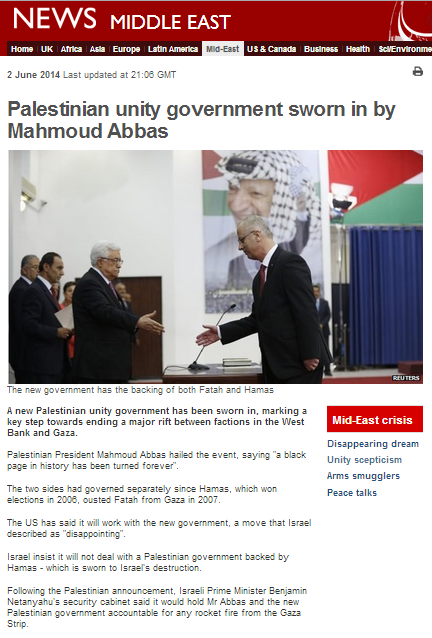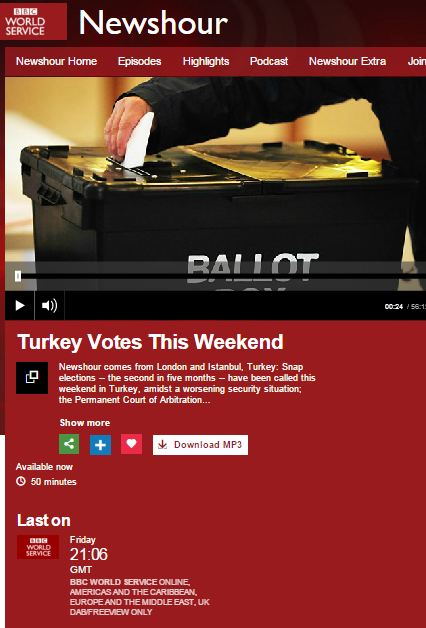The BBC News website’s coverage of the Hamas-Fatah reconciliation continued on June 2nd with a report titled “Palestinian unity government sworn in by Mahmoud Abbas“. Throughout the day that article underwent considerable changes, which can be viewed here. The report is as notable for what it does not tell BBC audiences as it is for what it does, so first let’s look at the latter.
Readers are provided with a sanitized description of the bloody 2007 coup in which Hamas took over the Gaza Strip by force.
“The two sides had governed separately since Hamas, which won elections in 2006, ousted Fatah from Gaza in 2007.”
No less euphemistic is this sentence from Quentin Somerville’s ‘analysis’ insert:
“Hamas wants Israel’s destruction and believes in an armed struggle to achieve this end.”
Although Sommerville has actually spent relatively little time in Israel since joining the BBC’s Jerusalem Bureau, even he must have noticed that Hamas does not just ‘believe’ in what he delicately terms “armed struggle” but engages daily in its practicalities.
Sommerville also fails to adequately inform BBC audiences regarding the straw that nearly broke the new PA government’s back before it was sworn in.
“A disagreement over the post of prisons minister was resolved, though, and the swearing-in of the new cabinet in Ramallah took place. It was another clear indication of the frailty of this uneasy partnership.”
The back-story which the BBC is not telling here involves an issue which it scrupulously avoids reporting: that of PA payments to convicted terrorists.
“Hamas may have scored a tactical victory with the inclusion of the ministry of prisoner affairs in the Palestinian unity government sworn in Monday, but a senior Fatah official told The Times of Israel that Western and Israeli pressure have succeeded in changing the way the Palestinian government funds security prisoners in Israeli prisons and their families.
As the Hamdallah government was being presented in Ramallah, Fatah official Kadoura Fares, head of the Palestinian Prisoners Club, still believed that the Prisoner Affairs Ministry would be abolished and replaced by a body subordinate to the PLO. […]
According to Fares, skittishness from Western donor states to contribute to the funding of the prisoners may mean the Palestinians will instead look to funnel inmates and their families money through the Palestine Liberation Organization.”
The report then goes on to present readers with what has become entrenched as the BBC’s simplistic one-liner explanation of the end of the recent round of negotiations between Israel and the PLO.
“Israel suspended crisis-hit peace talks with the Palestinians in April in response to the announcement of the reconciliation deal.”
The report amplifies a claim made by the PA’s president (failing, of course, to point out that his elected term of office expired five and a half years ago), but makes no attempt to present to readers any of the numerous complex issues which the establishment of this unity government creates – not least the failure of one of its midwives to disband its own militia.
“Hamas, which is designated a terrorist organisation by Israel and other countries, opposes the peace talks, though President Abbas has said the new government will abide by previous agreements.”
Towards the end of the article, the BBC insinuates that the depiction of restrictions of movement along a border with a territory controlled by an internationally recognised terrorist organization as security measures is open to interpretation.
“Three Gaza-based members of the new government were denied permission by Israel to cross into the West Bank for the ceremony.
Israel tightly controls who exits Gaza into its territory as part of what it says are security measures to prevent attacks.” [emphasis added]
Sprinkled throughout the article are statements describing Israel’s reaction to the new PA government.
“The US has said it will work with the new government, a move that Israel described as “disappointing”.
Israel insist [sic] it will not deal with a Palestinian government backed by Hamas – which is sworn to Israel’s destruction.
Following the Palestinian announcement, Israeli Prime Minister Benjamin Netanyahu’s security cabinet said it would hold Mr Abbas and the new Palestinian government accountable for any rocket fire from the Gaza Strip.
In a statement, Mr Netanyahu urged world leaders not to “rush to recognise” the new government.”
“It’s a partnership that many Palestinians have long wanted, and one that Israel says the world should reject.”
“Israel was swift to voice its displeasure.
“We are deeply disappointed by the state department regarding working with the Palestinian unity government,” an Israeli official said.”
“Israel said it would cease all but security co-ordination with the Palestinians if the government was formed.”
However, no attempt is made by the BBC to provide audiences with any background information which would allow them to understand the context of those cherry-picked statements.
It is not, for example, clarified that the creation of the Palestinian Authority government came about as part of the Oslo Accords and that the establishment of the PA was conditioned upon the PLO’s agreement to recognise Israel, to reject terrorism and to commit to the peace process. It is not made sufficiently clear that this temporary PA government made up of nominally independent unelected ‘technocrats’ was selected and approved by Hamas; an internationally recognised terrorist organization which is not part of the PLO, which rejects the Oslo Accords and which refuses to recognize Israel, to reject terror and disarm or to commit itself to a negotiated peace process. In other words, the new government of the Palestinian people has been selected, approved and formed by an actor which, under the terms of pre-existing agreements, is not recognised as being one of their legitimate representatives.
Further, it is not conveyed to BBC audiences that recognition of this new government by members of the international community hence signifies a circumvention of the very agreements (brokered, of course, by members of that same international community) which brought the PA into being, thus putting the credibility of such actors as intermediaries in any future negotiations in very serious doubt.
In order to be able to “participate in the global debate” on this particular “significant international issue”, BBC audiences would have to be aware of points such as those above. To date, the corporation’s superficial coverage of the Hamas-Fatah unity deal has come nowhere near to providing audiences with the comprehensive background they require in order to understand the issue in depth.




